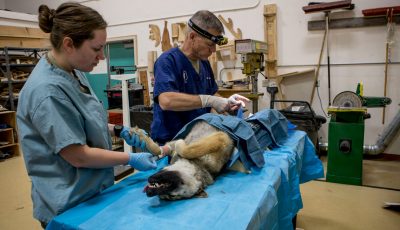THE OTHER EFFECT OF COVID-19 PANDEMIC
Emergency cases down, mental health services in demand
That the number of emergency cases at the Commonwealth Health Center has dropped is a welcome effect of the COVID-19 pandemic in the CNMI. Mental health services, on the other hand, are in demand.
This was a revelation at Wednesday’s Senate public hearing for the confirmation of Dr. Martin Rohringer and Dr. Glenda S. George as members of the Health Care Professional Licensing Board.
Rohringer is the chairman of Emergency Medicine at the Commonwealth Healthcare Corp., which operates CHC, while George is Clinical Services officer at the Community Guidance Center.
The two nominees were asked by Sen. Vinnie Sablan (Ind-Saipan) about their experiences in delivering pubic health services in the midst of the coronavirus threat on the island.
“As everyone knows, the island closed down earlier than other jurisdictions, giving us an opportunity to better prepare than some other places,” Rohringer said.
He cited the makeshift hospital set up outside CHC, and the screening of emergency patients in a controlled area of the hospital as some of the measures that the CHCC has put in place to prevent the transmission of any COVID-19 infections to the hospital staff, who could then pass it to patients.
“Overall, I think because of curfews, because of social distancing, and the banning of certain activities, we actually saw a drop in emergency room patients. …Actually, our numbers, total numbers that made it to the emergency department were down,” he said. “If nobody’s doing anything, nobody’s getting hurt. So you don’t have anybody with a sprained ankle or a cut hand because they’re not at work, and they’re observing curfews and other such things.”
The numbers, however, may soon start to come up as people get back to work and start participating in activities that they are now allowed to do, with some restrictions being lifted.
Mental health care
On the other side of the coin is the demand for mental health services, which remains, many of which are “normal concerns and anxieties that come with a disaster, especially a pandemic that we don’t know very much about,” George said. “As far as how the community has responded, perhaps it’s because this is not our first disaster, we see a lot of resilience in the community.”
To respond to the need of the community for mental health service, the CHCC has been continuously offering mental health services, remote and in-person, with mental health support lines available for people to text or call (1-800-985-5990 or text ‘TalkWithUs’ to 66746).
“We understand that safety comes before anything so we’ve been promoting virtual care as much as possible. As far as those who are in quarantine, we have daily checks, as far as mental health, to ensure that people feel that they are supported when in that situation,” he added.
“Face-to-face” services are also provided for those who are at high risk or have high needs. “We also have a mental support line for the community where we have people available to support anyone who has questions about mental health, when they’re feeling stressed out or anxious. We want to make that available to everyone, especially for our first responders and people out there who need that,” George added.
Overall successful
In terms of the CNMI’s response to the pandemic, both Rohringer and George thought that the measures CHCC has put in place have produced good results.
“I think, overall, it has been a very, very successful the way our leaders at the hospital set everything up and prevented further transmission and illness,” Rohringer said.
Collectively, as a community and with the leadership, George added that they have not seen “too many bumps” in the mental health team. “All in all, it’s been favorable and we’ve had pretty good outcome,” he said.



























